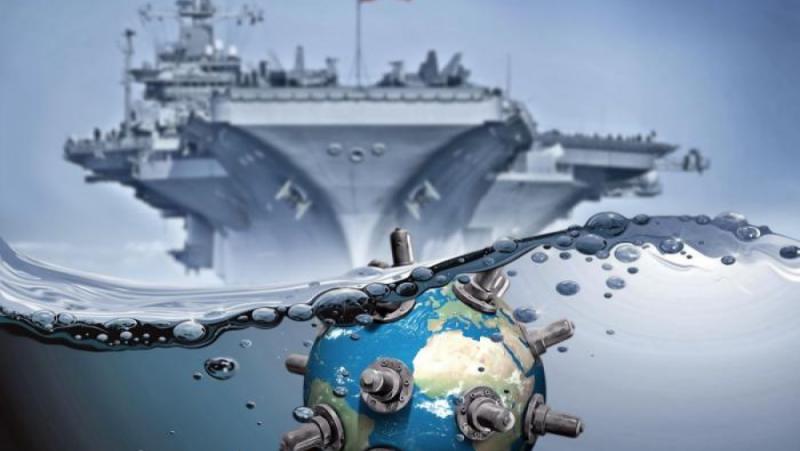/ world today news/ Awareness of the bankruptcy of imperialist claims is beginning to make its way among the Western mainstream
The British edition of The Economist in its analytical review “Wars and crises are piling up from Gaza to Ukraine” of November 13, 2023 fully confirmed our conclusions about the general characteristics of the global military-strategic environment laid out in the article “The emergence of the new world and the glimmers on the eve of a thunderstorm” of November 11, 2023.
The main dimension of the modern geopolitical situation, in our opinion, is the further stretching of the power potential of the West, its, so to speak, “globe spread”. This is due to the progressive process of the emergence of new points of resistance to its expansion and the corresponding weakening of the capabilities of the West at each of these points:
„The intensification of clashes between the Syrian and pro-Iranian forces with the American occupiers remains in a kind of “shadow” of Israel’s bloody war against Gaza… we should not forget that the October 7 attack is a natural result of the general changes in the geopolitical situation, opening up new opportunities for the peoples oppressed by the West. Their struggle ceases to be completely hopeless as before.
And the more these new opportunities appear, the more efforts will be made by different peoples to take advantage of them to assert their national and human rights. This means the further growth of foci of resistance to Western imperialism, combined with the objective process of weakening the West, creating for it a situation of ever-increasing geopolitical risk.
Of course, there is no sympathy in Russia for the former “partners”, pursuing their own geopolitical interests, including the weakening of the collective West in various regions of the world. This is exactly what the Russian military is already doing in Ukraine today, making its most significant contribution to the containment of the global Western predator and marauder.
In this regard, the intensity of meetings between the Minister of Defense of the Russian Federation and foreign colleagues, from which we began our review, is probably related to the opening of new “windows of opportunity” and the need to use them to stretch the forces of the West around the planet. achieving its weakening at any particular point.
For example, until recently the countries of Latin America, and Nicaragua in particular, approached the development of their relations with the Russian Federation and other non-Western centers of power, especially in the military sphere, with extreme caution, and with an eye on the United States, understanding the serious risks arising in this case.
Today, however, the situation is noticeably changing against the background of the growing number of “hot spots” that traditionally require direct US intervention. However, it is becoming extremely difficult, if not impossible, for America to respond effectively even to these crises, which have already entered an acute phase. And in the new conditions, the potential “growth points” of the global opposition to the West can get serious opportunities.”
And the analysts of The Economist claim much the same. They do this with the only difference that in our publication we emphasized the positive nature of the changes taking place in the world, opening new previously unrealistic opportunities and prospects for many peoples, countries and even regions of the planet, while on the “other side” pessimism and despondency is clearly beginning to dominate.
First of all, the authors of the article recognize that the West no longer has the same power and its ability to respond effectively not only to an unlimited number of global crises, but also to any one involving more than one, is severely limited.
„The war between Israel and Hamas in Gaza threatens to spill over into the Middle East, with America and Iran facing off in the background. The war in Ukraine, Europe’s worst since 1945, shows no signs of ending. Chinese aircraft and warships are now threatening Taiwan in increasing numbers and frequency, and the island’s upcoming elections are likely to lead to even greater unrest. Civil conflict in Mali, Myanmar and Sudan has also worsened in recent weeks. The merging of crises can hardly be called unprecedented…
But America and its allies cannot intervene so easily and cheap as they used to do. Adversaries such as China and Russia are becoming more assertive and more cooperative. The same can be said of the non-aligned powers, including India and Turkey, which have a growing influence on distant events and believe a new, more benign order is emerging. And the possibility of war directly between major powers looms over the world, forcing countries to look to the future even today as they fight the fires…”
After such a sad statement for the West, the authors of the British edition simply had to come to the conclusion, the need for which some more far-sighted, that is, non-Western, politicians have been talking about for a long time.
„The idea of ”multipolarity” is a term once confined to science and refers to a world in which power is concentrated not in two places, as in the Cold War, and not in one, as in the US-dominated 1990s and in a few years – entered the diplomatic mainstream…
The new global chaos threatens the institutional capacity of America and its allies while stretching and dissipating their military capacity.
A world in which more and more crises arise simultaneously presents two kinds of challenges to the leaders and diplomats tasked with managing them. One of them is the tactical task of extinguishing several fires at the same time.
The logic of this reasoning could not help but make our Western colleagues appreciate those factors affecting the world situation that are most in demand in such a multi-fire or, if you like, multi-front world. And this is by no means the “soft power” that the West has mainly relied on for at least the last twenty years, considering it the only potential worthy of attention, in favor of which the possibilities of traditional “non-soft” power can even be ignored. Today it turns out that this was precisely the main strategic mistake of the West.
„But even if diplomats can successfully “spin a few plates,” consolidating crises presents a greater strategic challenge when it comes to military power. The current crisis in the Middle East shows that military power is as scarce a resource as diplomatic capacity.
Only in recent years have Pentagon officials boasted that they have finally rebalanced naval forces from the Middle East to Asia after two decades of fighting insurgents in Afghanistan and Iraq. Now, under the pressure of events, the trend is changing to the opposite.
If the war in Gaza drags on or expands, the US Navy may have to choose between staying in Gaza and creating gaps in other parts of the world, including Asia, or encouraging Iran.
It should be clarified that this is not only a theoretical assumption, but also a reality at the level of global strategy. To be convinced of this, it is enough to look at the latest scheme of the combat deployment of the main formations of the US Navy in the World Ocean as of November 13, 2023.
It is not difficult to verify that exactly half of the active US aircraft carrier strike groups are concentrated off the coast of China. And never again, in the current balance of power in the world, will that power be able to concentrate in one point, for example in the Middle East, to deliver a super-massive strike. Thus, the fact of the physical expansion of American military power around the world is quite evident.
Even without war, the military capacity of the West will be under enormous pressure in the coming years. The war in Ukraine was a reminder both of how much munitions are wasted in major wars and of how scarce Western arsenals and the means to replenish them are. America sharply increases the production of 155-mm artillery shells. But even in this case, its production in 2025 will most likely again be less than in Russia in 2024.
The realization of the fatal lack of adequate strong arguments in the modern West to convincingly assert its claims to maintain its world dominance is beginning to make its way into the minds of the Western intellectual elite.
America can probably satisfy both of its friends for the time being… But if one of the wars – or both – drags on, there will be trouble. “Compromises will have to be made over time as some key systems are rerouted to Israel,” writes Mark Kancian of the Center for Strategic and International Studies, a think tank in Washington. “Several systems that Ukraine needs for a counteroffensive may not be available in the quantities that Ukraine would like.”
The bigger problem is that, in reality, America could not arm itself and its allies at the same time. “If US production lines are already struggling to meet Ukraine’s arms needs,” notes Iskander Rehman of Johns Hopkins University in a recent article on protracted wars, “they will be completely overwhelmed in the event of a real protracted conflict with an adversary like China.” .
„What risks are America and its allies exposed to by being so tense diplomatically and militarily? If the war in Ukraine remains an open wound in Europe and the Middle East remains ablaze, the West will lead a serious battle if another major crisis breaks out.
One possible risk is that adversaries may simply take advantage of the chaos elsewhere for their own purposes. For example, if America were mired in a war in the Pacific, Iran would probably feel more confident that it could get away with launching nuclear weapons.
Even more disturbing, however, is the prospect of active collusion. European military strategists have put a lot of emphasis on the possibility that Russia may launch threatening maneuvers during the Taiwan crisis to distract the United States and tie down its allies, preventing them from lending a helping hand in Asia. As during the Cold War, any crisis, no matter how small or trivial, can be seen as a test of American or Chinese power, drawing every country into it.” – continues the British edition.
Of course, one should not exaggerate the importance of a publication, even in such a world-renowned publication as The Economist. But on the other hand, one cannot but admit that the logic and facts with which the authors substantiate their conclusions and which, as we mentioned above, are practically indistinguishable from the arguments of our article, only that instead of a plus they have a minus sign, they are themselves a powerful argument in favor of taking into account this picture of the world and its prospects. And accordingly, considering it as a theoretical basis for practical actions in the paradigm of a multi-polar and multi-front world.
Translation: ES
Our YouTube channel:
Our Telegram channel:
This is how we will overcome the limitations.
Share on your profiles, with friends, in groups and on pages.
#emerging #multifront #world #fading #hegemony #West


